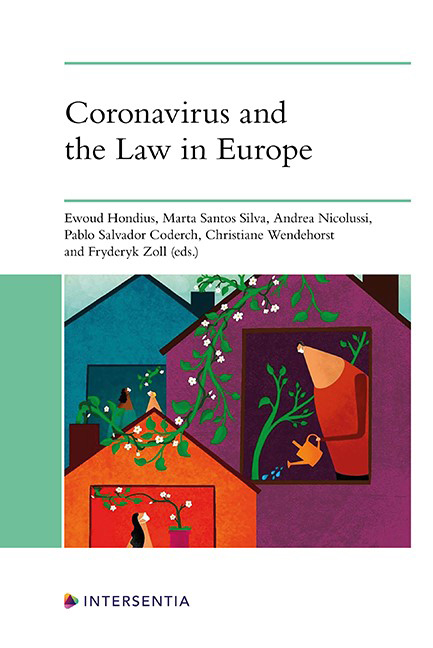Book contents
- Frontmatter
- Preface
- Contents
- List of Keywords
- List of Contributors
- PART I COVID-19 AND FUNDAMENTAL RIGHTS
- PART II STATES AGAINST THE PANDEMIC
- PART III COMPENSATION FOR COVID-19 RELATED DAMAGE
- PART IV CONTRACT LAW
- PART V CONSUMER LAW
- PART VI LABOUR AND SOCIAL LAW
- PART VII CORONAVIRUS CHANGING EUROPE
- Epilogue
- Annex: ELI Principles for the COVID-19 Crisis
- About the Editors
COVID-19 and its Impact on Ukrainian Criminal Law
Published online by Cambridge University Press: 10 December 2021
- Frontmatter
- Preface
- Contents
- List of Keywords
- List of Contributors
- PART I COVID-19 AND FUNDAMENTAL RIGHTS
- PART II STATES AGAINST THE PANDEMIC
- PART III COMPENSATION FOR COVID-19 RELATED DAMAGE
- PART IV CONTRACT LAW
- PART V CONSUMER LAW
- PART VI LABOUR AND SOCIAL LAW
- PART VII CORONAVIRUS CHANGING EUROPE
- Epilogue
- Annex: ELI Principles for the COVID-19 Crisis
- About the Editors
Summary
At the end of 2019 and the beginning of 2020, a new dangerous disease appeared in the world, which was named “COVID-19”. Each country decided how to react and what steps should be taken as a first priority. The fact that national governments were taking exceptional measures to slow down the spread of the virus and to deal with the pandemic has implications not only for criminal proceedings that are already underway but also for future ones. In this scrutiny, the author highlights the legal response of Ukraine to the pandemic from the criminal law perspective. A number of restrictive measures and prohibitions were adopted, which were aimed at self-isolation. The focus in this contribution is on criminal law, as the pandemic has prompted changes to existing law, including criminal law and legislation. The immediate reaction of the Ukrainian parliament to the pandemic was to increase criminal liability and introduce administrative liability for violating quarantine. These changes have become the subject of this contribution. Also, a number of bills on amendments in the current Criminal Code in connection with the coronavirus are analysed.
INTRODUCTION
The COVID-19 pandemic, announced by the World Health Organization (WHO) on 11 March 2020, has had a major impact on all aspects of our lives. Significant vulnerabilities were noted in various areas (primarily health and biosafety, cybersecurity, economics, etc.). Each State decided independently how to react and what steps to prioritise. Is it possible to overcome the pandemic by persuading citizens to take restrictive measures? Should the State ensure the fear of criminal liability?
According to the Centre for Public Health, as of 3 October 2020, 222,322 cases of COVID-19 were confirmed in Ukraine, of which 98,737 recovered and 4,353 passed away. During the crisis in Ukraine, the situation was also complicated due to the warfare in the east of the country, the reform period and changes in the government. This contribution explores the impact of COVID-19 on some areas of Ukrainian criminal law. It shows that legal responses to the pandemic determine the severity of problems such as ineffectiveness of legislative changes, lack of criminalisation of some socially dangerous acts, overcriminalisation, and disproportionate punishments. In general, this applies to the establishment of criminal liability for violation of quarantine restrictions, pricing, resale and release through customs common goods for controlling and preventing the spread of epidemics.
- Type
- Chapter
- Information
- Coronavirus and the Law in Europe , pp. 115 - 130Publisher: IntersentiaPrint publication year: 2021
- 1
- Cited by



